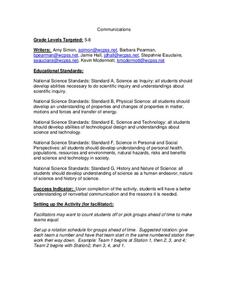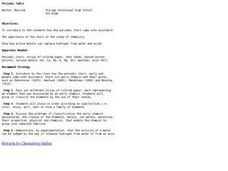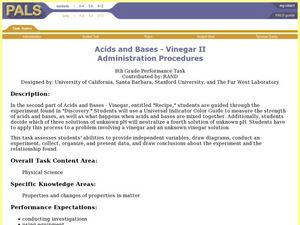Curated OER
What Boat Designs Float the Best?
Fifth graders investigate buoyancy by conducting a science experiment. In this water properties lesson, 5th graders predict which of their different paper boat designs will float for the longest period. Students conduct the...
Curated OER
Chemistry Review
In this chemistry review worksheet, students read about atoms and the periodic table and they complete a chart using the periodic table to find the atomic number, atomic mass and group of given elements. Students answer 5 questions about...
Curated OER
Making Molecules
In this making molecules worksheet, students complete a table of elements with their symbol, atomic number, atomic mass, number of protons, number of electrons, period and group. Students then make models using pipe cleaners and beads of...
Curated OER
Communications
Students incorporate different disciplines into this lesson. In this science lesson, students investigate the use of communicating without words, and how it is different than communicating with words. They discuss the pros and cons of...
Curated OER
Different Minerals
In this minerals worksheet, students read about the relationship between elements, rocks and minerals. They experiment using 6 different colored gumdrops to represent 6 common elements. Students construct gumdrop and toothpick models of...
Curated OER
Compounds and Mixtures
In this compounds worksheet, students draw a line to match the word with the definition. Students also match foods with their correct term.
Curated OER
The Interactive Periodic Table of the Elements
Learners study the different types of metals. For this investigative lesson students watch a demonstration on the effects of temperature on atoms and take a tour through baone matter.
Curated OER
Measurement of the Depth of the Ocean
Students comprehend the physical properties of pressure and Boyle's Law by designing a depth gauge. They construct a capillary depth gauge and calculate the calibrated depth marks of the capillary tube. They determine the margin of error...
Curated OER
Polymers
Young scholars explore online tutorial on polymers. In this chemistry lesson, they create two polymers in the lab and compare their properties. They write a sales letter about their new and improved polymer product.
Curated OER
Microscopes and Crystals
Students observe crystals under the microscope. In this science lesson, students compare how the crystal look like using their eyes, hand lens and microscope. They identify the type of crystal based on the amount of light they allow to...
Curated OER
Sink or Swim
Students define density and explain how to determine the density of an object. Students participate in a demonstration that shows the differences in the densities of different liquids and how they affect the liquid's physical properties.
Curated OER
Melting and Freezing
Fifth graders observe experiments with ice and water. They complete a Venn diagram listing the properties of each. They experiment with ice and water, comparing their weights. They note the weights are equal.
Curated OER
Periodic Table & Its Trends
Students review atomic structure and then participate in a activity in which they categorize several "elements" into some form of order based on their properties. They discuss the trends they see. They also practice several electron...
Curated OER
Sometimes, solid + liquid = gas
Third graders experiment with common household liquids and solids. In this chemical reaction lesson, 3rd graders discuss phase changes and experiment to find other ways to create gases. They use water, vinegar, lemon juice, flour, baking...
Curated OER
How Can You Tell One Clear Gas From Another?
Fifth graders perform experiments to determine the identity of an unknown gas sample. In this chemistry lesson, 5th graders fill balloons with air, oxygen, hydrogen, and carbon dioxide. They use mass and reactivity to identify the gases.
Curated OER
Modern Physics, New Phenomena
In this physics worksheet, students examine some of the historical theories of physics through the completion of 11 questions.
Curated OER
Environmental Studies: The Environment Rocks!
Rock exploration, so exciting! After reading the book Everybody Needs a Rock, the class makes sandwiches to better understand that the Earth is made in layers. They then use a description of the 3 types of rock to conduct an observation...
Curated OER
Our Earth Crossword Puzzle
In this earth's environment worksheet, students use the 20 clues and their problem solving skills to correctly complete the crossword puzzle.
Curated OER
What's Organic?
Young scholars discuss background information presented by the teacher and read dictionary definitions for the words "organic" and "synthetic." In this gardengin lesson, students complete a worksheet on the material. Young scholars grow...
Curated OER
Essential Elements
A color-coded periodic table identifies organic elements, major minerals, and trace elements. Oxidation states are highlighted and types of chemical bonding are annotated. The electron energy level chart is explained. Though not all of...
Curated OER
The Effects of Temperature on Solids
Students explore the effects that extreme temperatures have on the material properties of solids. They investigate the properties of a material whose state depends on extreme temperatures and witness how it interacts with room...
Curated OER
Periodic Table
Young scholars identify the periodic table trends and predict material properties. They also design and conduct simple experiments and test material properties. Finally, students compare and contrast material properties and that...
Curated OER
Acids and Bases - Vinegar II
Eighth graders experiment what happens when acids and bases are mixed together. In this acids and bases experimental activity, 8th graders decide which of three solutions of unknown pH will neutralize a fourth solution of unknown pH.
Curated OER
Oxygen: What a Gas!
Eighth graders explain how oxygen reacts to other elements. They also explain why oxygen is a reactive substance, how it has weight, and how it reacts with other substances. They construct an experiment to relate their findings.

























